As the new semester arrives, it is high time for students of Wuhan University to take courses, appreciate truth and beauty, and savor life. Are you an art buff or a science enthusiast? Whatever you seek, you will find your spot in WHU. Let’s go and have a look!
Architectural Decoration Ramble: wandering in beauty and art

Flower arranging
It was night, but the light streamed down, casting rippling shadows at the petals swaying in the gentle breeze. A waft of fresh air slipped in through the window, whistled, and brought the sweet scent of fresh flowers to everyone in the classroom. It was the flower arrangement class of Architectural Decoration Ramble, given by Assoc. Prof. Wu Dingyan from the School of Water Resources and Hydropower Engineering of WHU.
At the first meeting, Dr. Wu, wearing a stunning smile, gave students a message, “there will be a flower arrangement contest in this course.” The words had scarcely escaped her when a ripple of excitement ran through the classroom, bursting with expectation. In the following few weeks, led by Wu, students immersed in the endless ocean of architectural and aesthetic knowledge, preparing for the oncoming activity.
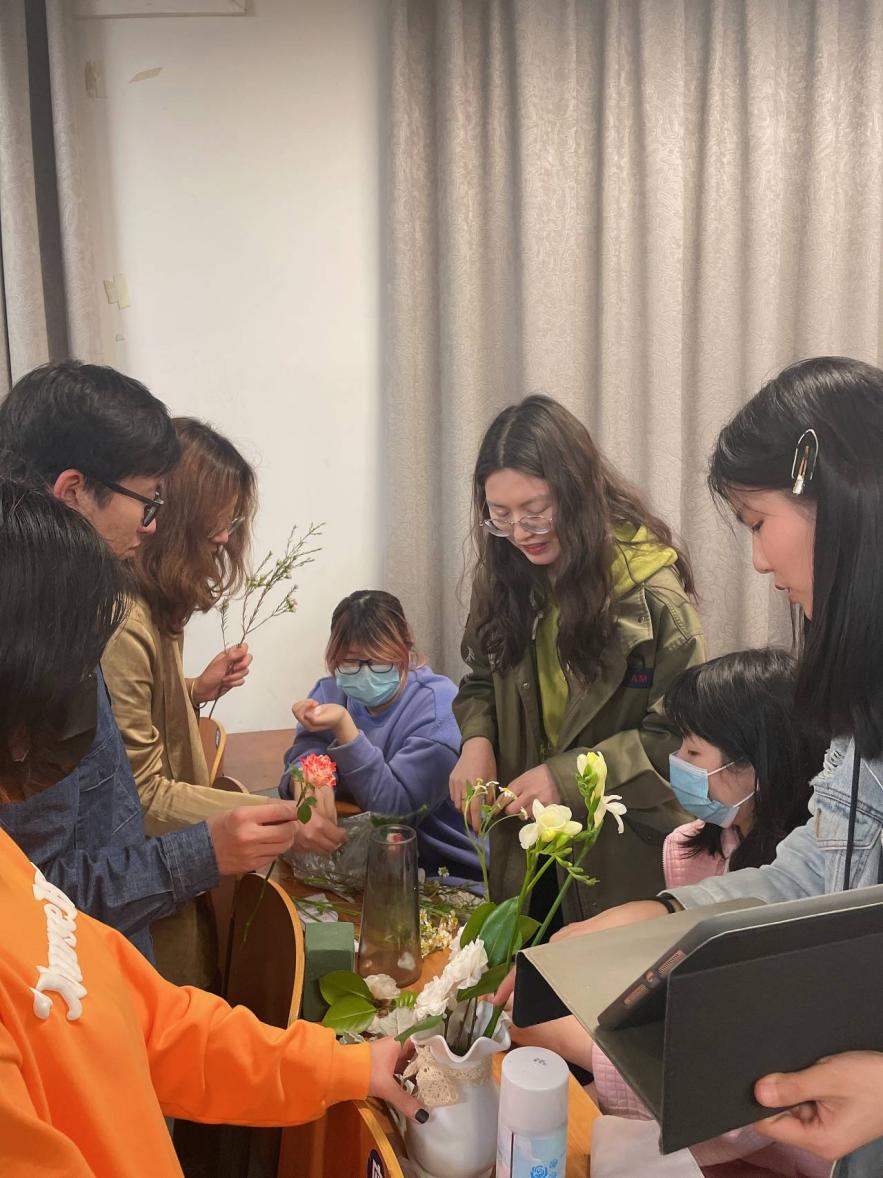
Students practicing flower arrangement
When the day arrived, groups of students busied themselves picking fresh blooming flowers and various containers, creating novel ideas as well as communicating with the teacher. Some put flowers in an umbrella, some filled a cage with flowers, and some even turned flowers into a cascading spring. When students’ thoughts unfolded their wings on the podium, Wu stood by and listened patiently with pride gleaming in her eyes. With lights and shadows filtering down, and art and beauty interweaving, a feast of imagination and art was weaved in this ordinary night. Decked out in flowers, the classroom looked like the nightly sky dotted with innumerable sparkling stars.
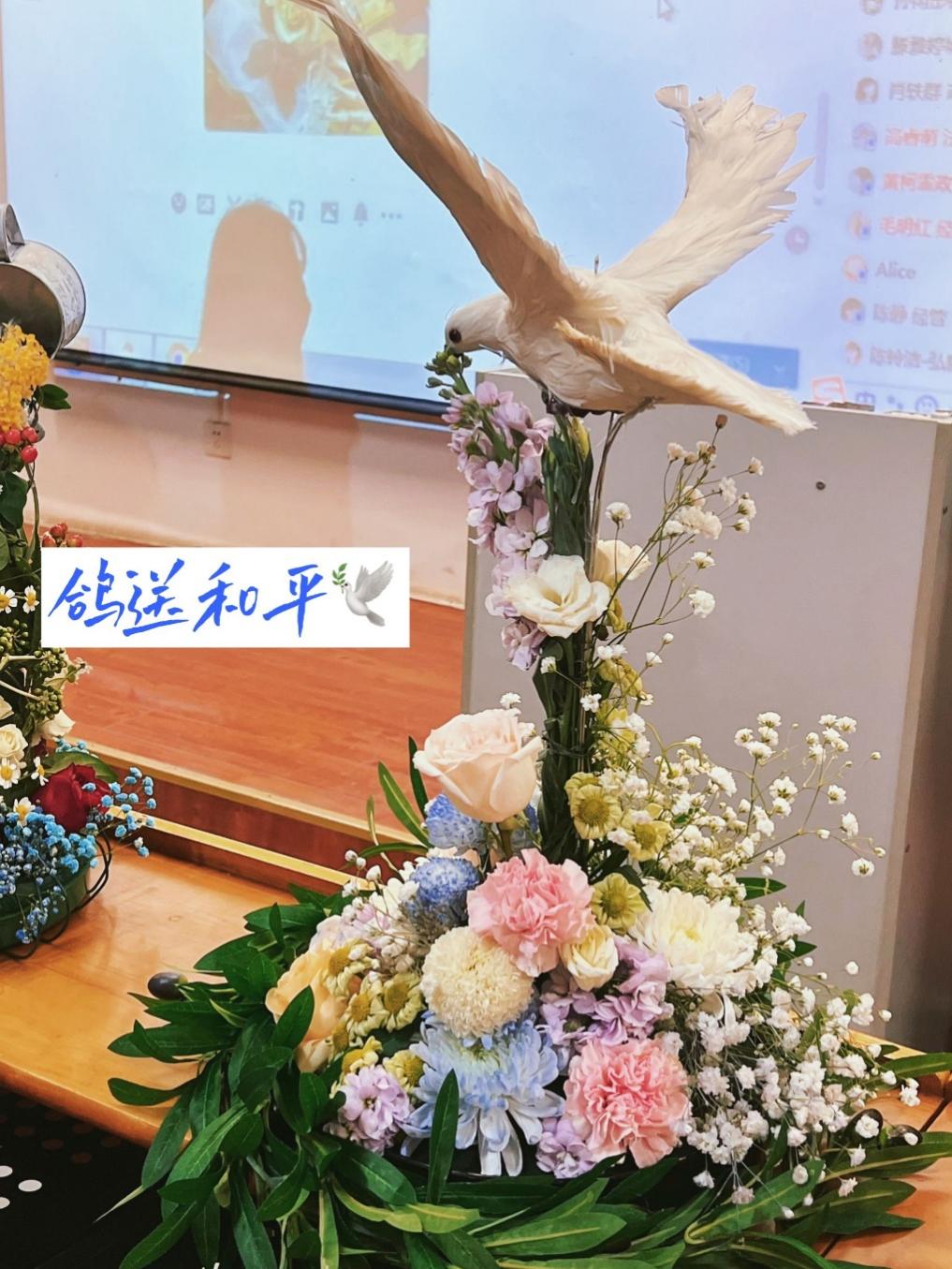
A work of students: Ge Song He Ping (The dove sending peace, pronounced as ‘eulogizing peace’ in Chinese)
The day was unusually cold, and the world seemed to have stopped at that moment. However, the dense earthy-sweet scent rising from the ground enveloped everything within its soft embrace, brightening up an originally uneventful night. Life is not a bed of roses, but eyes to find roses in life do make the world go around.
Chinese Tea Culture: tasting tea, tasting art
Apart from the fragrance of flowers, bustling life is also filled with water, coffee, and milk-tea. Students all perceive Prof. Liu Litang, Researcher Song Shilei and Ms. Li Fang’s class as a land of idyllic beauty where they can enjoy the internal serenity through tasting and appreciating tea.

Pouring tea
Cleaning the utensils, placing tea leaves in a cup, adding water, and having a taste… Tea culture is a combination of lifestyle and philosophical thoughts through the whole process of making tea, appreciating tea, smelling tea, and enjoying friendship through tea. The fragrance of tea leaves melts in hot water, then squeezes out of the tea cup, wandering around the whole classroom. When the tea flows, it smoothes one’s throat and lightens up one’s spirit, as if breathing in the morning-fresh air of a thick forest.
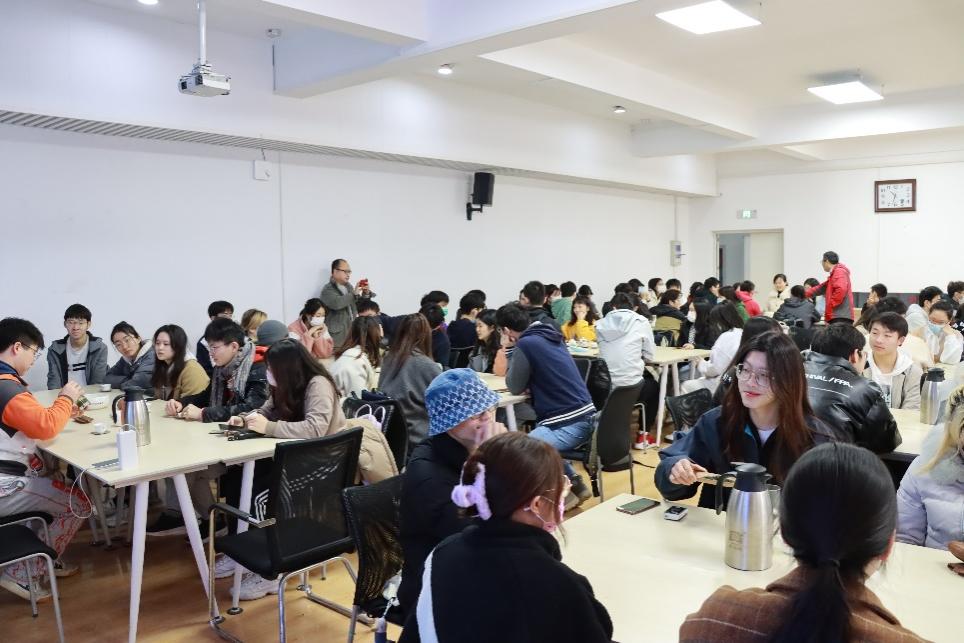
Students making tea together
Song Shilei has conducted a lot of in-depth research on Chinese tea culture and has been giving lectures to students for years. In addition, he is also the adviser of the Student Association of Tea Art, trying to promote the spirit of tea art outside the classroom. “Tea culture is intangible, but tea cups and tea leaves are not.” Song emphasized that the experience of tea-tasting is a better instructor than him.
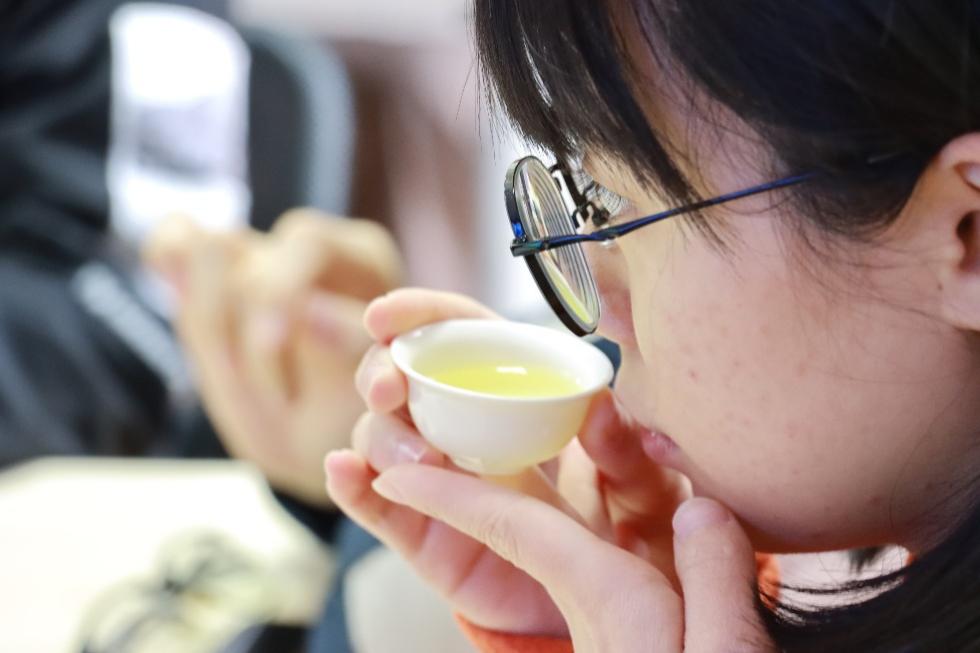
Student appreciating tea
In 2020, one tea-tasting class was coincidentally scheduled during the Mid-Autumn Festival, where students all received well-prepared mooncakes from teachers. Having a bite of sweetness and a sip of warmth, students, including domestic and international ones, all felt blessed to be in class. For them, more than tea culture was taught—enjoying life and treasuring friends were the more precious ideas the professors conveyed.
Science of Health Preservation through TCM: bringing science to students
Did you know that drinking tea is regarded as a way to preserve health? Do you know how to use common foods in life to treat mild illnesses? Do you know which conditions and symptoms can be treated with a cold water bath? Do you know what adverse reactions during acupuncture should be avoided? In the course Science of Health Preservation through Traditional Chinese Medicine (TCM) you are bound to find the answers.

The first class of Science of Health Preservation through TCM
The course is delivered by four experts from the Department of TCM of Renmin Hospital of Wuhan University (Hubei General Hospital). Due to the dual role as clinician and teacher, the lecturers often use clinical cases in class to keep science closer to life instead of out of reach. For instance, when it comes to dietary therapy, Prof. Song Enfeng mentioned that he once gave a prescription based on the homology of medicine and food to a patient with adverse reactions to surgical chemotherapy for breast cancer who even had difficulty in drinking.
Also, some beneficial weight-loss methods and dietary remedies were taught. As the lecturer said at the beginning of the semester, through the course, students are expected not only to gain theoretical knowledge but also to strengthen their bodies in practice.
Through the course, a nameless quiet power came from the racing pulse, from the depths of life, and probably from the long stretch of Chinese traditional culture handed down for thousands of years, pulling at listeners’ heartstrings and spreading the seeds of science to every student.
History, style and aesthetics of popular music: immersing in pop music
Stepping out of Chinese traditional culture, it is easy to see that modern culture attracts WHUers as well. Many students at WHU love playing and listening to pop music, and Dr. Wang Yuan, a lecturer from the School of Art took notice of this phenomenon.
As a product of the modernization process, Chinese pop music is greatly influenced by Western modern civilization. On the one hand, the cultural divergence between the Eastern and Western worlds has been somewhat dissolved due to globalization, while, on the other hand, Eastern culture has become more distinct. As a result, public aesthetic taste is gradually moving towards a single dimension, making it difficult to develop personal comprehension of Chinese pop music. In response to this phenomenon, Wang Yuan believes that “the fusion of the Western pop music form and Chinese cultural characteristics should be instilled into everyone’s heart, allowing the forming of unique and personal understandings of pop music.”
This is what led Dr. Wang to start the course History, style and aesthetics of popular music. Drawing on history, it introduces the most important styles and genres of Western pop music as well as the main musicians and their works. The aims of the course are to appreciate music, understand the culture behind music flows, guide students to become “active listeners”, and thereby establish their independent aesthetic awareness and ability of music appreciation.
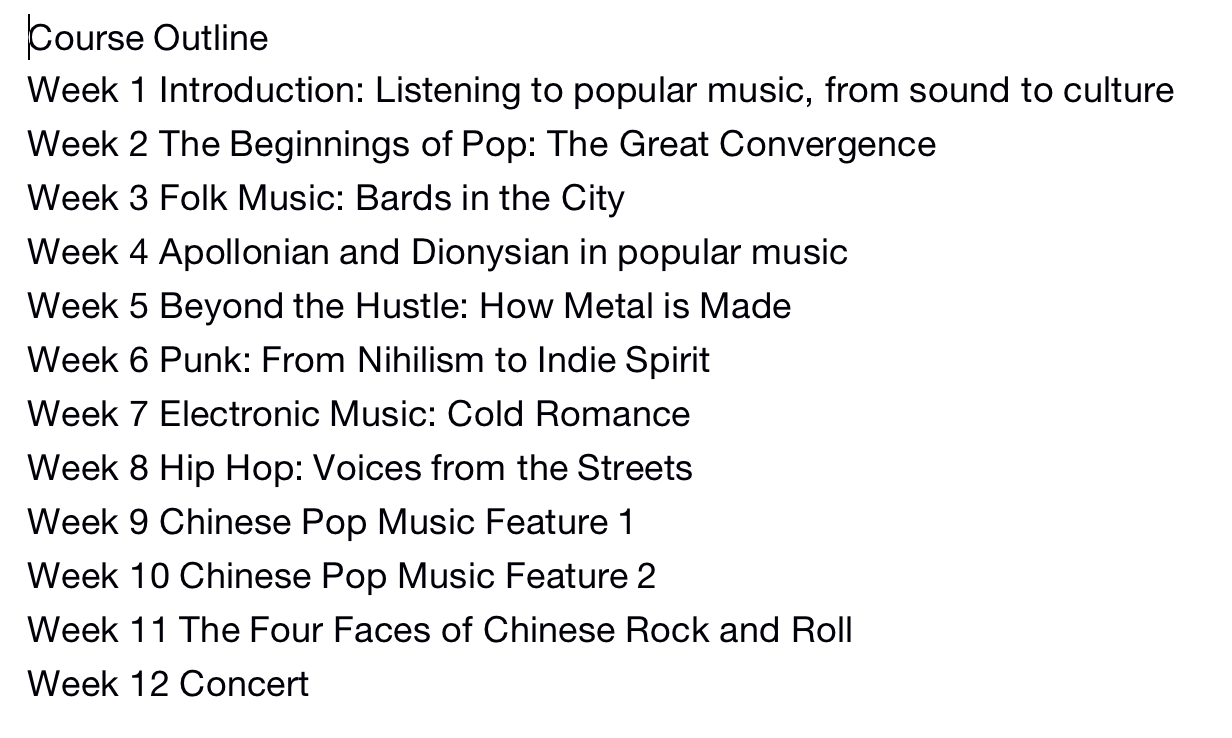
Course outline of History, style and aesthetics of popular music
“We need to establish an accommodating view of music and perceive the beauty of different kinds of music independently. At the same time, the ability to form value judgments about music is also important,” said Wang Yuan.
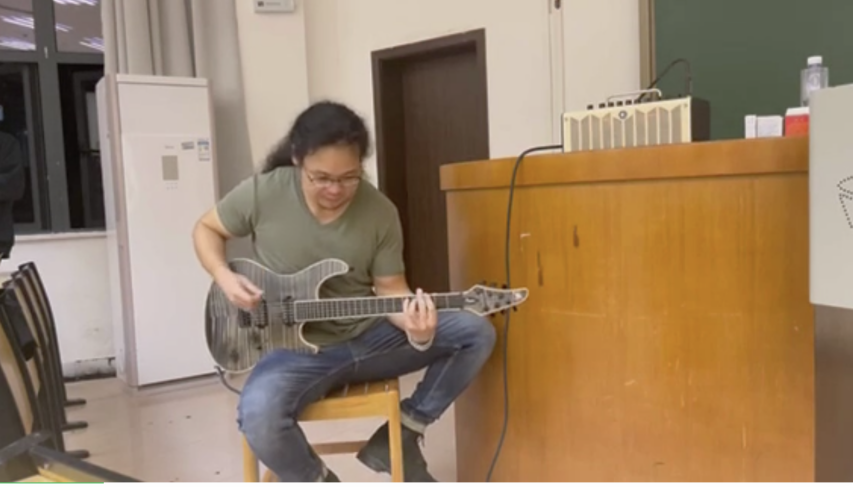
Wang Yuan demonstrating metal music in class
As for the ideal teaching style of the course, Wang wants to make the classroom interesting and alluring. A large number of audio-visual materials are used to stimulate students’ interest and encourage them to participate. At the same time, professional music instruments are introduced into the classroom, and students are encouraged to play with them. Student concerts are held as part of the course. “I hope students can be released from reality and utilitarianism when immersed in music appreciation, thought and expression,” Wang said.

Exciting student concerts organized by Dr. Wang’s class
Beyond any doubt, Prof. Wang is greatly admired by his students. “He is humorous and talented, and the course is full of cadence and emotion,” said Lin, a big fan of the course. “Although it is a pop music appreciation course, we can also perceive the philosophy and truth of life while learning music and culture.”
History, style and aesthetics of popular music is an innovative tryout in the curriculum module of Art experience and aesthetic appreciation, aiming to bridge the gap between music form and the culture behind it. “My students are also my friends,” laughed Wang Yuan, “whoever loves music is welcome in my class.”
New concepts of the universe: science visible in telescopes
After the student concerts on the playground, stars are still shining on the curtain of night. They take away all the colors of the sky, sparkling brightly above the faraway mountains, with scattered planets decorated around them like flowing streams. This stunning view of the universe is not provided by astronomers but by students of Prof. Zhao Jiangnan’s class, New concepts of the universe.
Every once in a while, Prof. Zhao takes students out to the platform on the roof, using an astronomical telescope to observe the sky. “The stars shone more brightly before my eyes than on the PowerPoint,” said Hu Ruting, a student taking the course, “and they revealed the grandness of the universe to me.”

Students using the astronomical telescope
There is more fun in Prof. Zhao’s class. He uses personal anecdotes to shorten the distance with the students, lists metaphors to illustrate obscure concepts, and plays movies or documentaries to leave students with a deeper impression. The white hole theory, the ultimate theory, the hypothesis of the universe’s end, and the planetary distance measurement…these similarly opaque professional terms easily make sense to students from different majors after Prof. Zhao’s humorous and intriguing lectures.
What Prof. Zhao wants to convey through class is not only the universe but also the capability to observe and solve problems, the courage to be bold and innovative in the face of scientific problems, and an attitude of rigorous research.
With such and many other interesting elective courses, students in WHU cultivate their characters through tradition and culture, and enrich their understanding of scientific knowledge. They wander in science, roam in art, fill the classroom with joy, and decorate their lives with growth.
Photo by Wu Dingyan, Cheng Shiwen, Miao Zhengyan, Hu Ruting and Wang Yuan
Edited by Zheng Zicheng, Li Hefeng, Qin Zehao, Qin Shihan, Zhang Yilin, Sylvia, Xi Bingqing